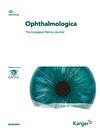The Therapeutic Conversation and a Holistic Approach to the Management of Patients with Neovascular Age-Related Macular Degeneration
IF 2.1
4区 医学
Q2 OPHTHALMOLOGY
引用次数: 0
Abstract
In the recent paper by Zvi et al. in Ophthalmologica, they demonstrate that reassuringly in the management of patients with neovascular age-related macular degeneration, virtual evaluation results in similar treatment decisions compared to standard face-to-face clinical examination. However, we would caution against the exclusive use of virtual clinics to manage macula clinics but rather intersperse virtual clinic appointments with regular face to face assessments. Many macula patients who are often experiencing progressive visual loss derive benefit from a face to face "therapeutic conversation". Furthermore, there are many patients with end-stage macular disease who may not require or do not want to continue with ongoing anti-VEGF treatment, but as a result of repeated virtual assessments, they remain on unnecessary repeat clinic appointments, adding to the existing issues with capacity. In order to address this, we introduced a multidisciplinary face to face macular clinic at our tertiary referral centre as a one-stop consultation for patients with advanced macular disease who are deemed to no longer benefit from further treatment or follow-up or have intimated to a member of staff that they are no longer keen on further treatment. We would recommend that this holistic multidisciplinary clinic which we have described is the best way of managing end-stage macula patients.新生血管性年龄相关性黄斑变性患者的治疗对话和整体治疗方法
在Zvi等人最近发表在《眼科学》杂志上的论文中,他们证明,在新生血管性年龄相关性黄斑变性患者的管理中,与标准的面对面临床检查相比,虚拟评估会导致类似的治疗决定,这令人放心。然而,我们要提醒大家,不要只使用虚拟诊所来管理黄斑诊所,而是将虚拟诊所预约与定期面对面评估穿插在一起。许多经常经历渐进性视力丧失的黄斑患者从面对面的“治疗对话”中受益。此外,还有许多终末期黄斑疾病患者可能不需要或不想继续进行抗VEGF治疗,但由于反复进行虚拟评估,他们仍在不必要的重复诊所预约,增加了现有的能力问题。为了解决这一问题,我们在三级转诊中心推出了一个多学科面对面黄斑诊所,作为晚期黄斑疾病患者的一站式咨询,这些患者被认为不再受益于进一步治疗或随访,或者已经向工作人员暗示他们不再热衷于进一步治疗。我们建议,我们所描述的这种全面的多学科诊所是管理终末期黄斑患者的最佳方式。
本文章由计算机程序翻译,如有差异,请以英文原文为准。
求助全文
约1分钟内获得全文
求助全文
来源期刊

Ophthalmologica
医学-眼科学
CiteScore
5.10
自引率
3.80%
发文量
39
审稿时长
3 months
期刊介绍:
Published since 1899, ''Ophthalmologica'' has become a frequently cited guide to international work in clinical and experimental ophthalmology. It contains a selection of patient-oriented contributions covering the etiology of eye diseases, diagnostic techniques, and advances in medical and surgical treatment. Straightforward, factual reporting provides both interesting and useful reading. In addition to original papers, ''Ophthalmologica'' features regularly timely reviews in an effort to keep the reader well informed and updated. The large international circulation of this journal reflects its importance.
 求助内容:
求助内容: 应助结果提醒方式:
应助结果提醒方式:


